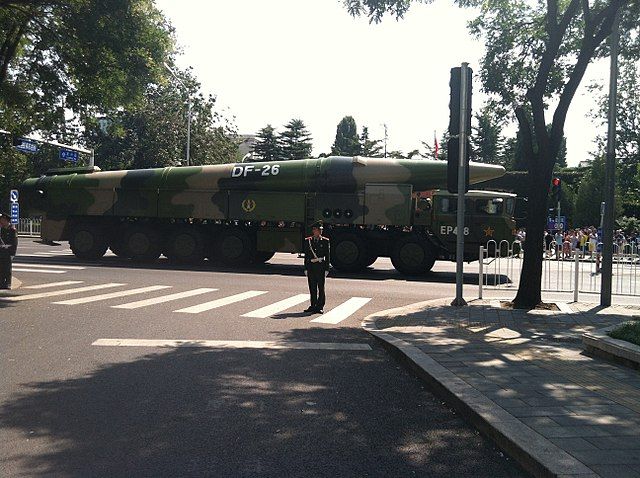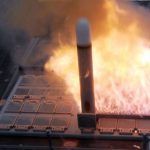We don’t have a missile gap in Asia. We have a diplomacy gap.
By Alexandra Bell | November 2, 2018
 A Chinese DF-26 intermediate range missile and launcher.
A Chinese DF-26 intermediate range missile and launcher.
Leaders and citizens across Europe are understandably worried about security on the continent as the United States and Russia consider the fate of the INF Treaty. With only one formal strategic stability dialogue in the 21 months that President Trump has been in office, it is clear that maximum pressure has not been the approach to diplomatic efforts that could save the landmark agreement. In fact, Defense Secretary Jim Mattis says the administration has “done everything” it can and jokingly asked for people to email him with possible solutions. The Europeans are not likely to find that funny, nor are people across Asia who may now have to contend with their very own regional arms race.
Indeed, in the days since the president’s brusque dismissal of the INF Treaty, there has been a chorus of analysts who have welcomed a world made safe for boundless amounts of ground-launched intermediate-range missiles. These systems, some seem to imply, are so necessary for deterrence in the Pacific theater that insecurity in Europe could be acceptable collateral damage. Beyond the alarming idea that security in one region of the world should be sacrificed to the altar of “flexible options” in another, the need for these missiles is unclear at best.
In March 2017, Vice Chairman of the Joint Chiefs of Staff Gen. Paul Selva informed Congress that, “there are no military requirements we cannot currently satisfy due to our compliance with the INF Treaty. While there is a military requirement to prosecute targets at ranges covered by the INF Treaty, those fires do not have to be ground-based.” The general went onto say that circumstances could change that assessment, but no such notice has been presented to Congress as of yet.
Proponents of more missile options in Asia latch onto the idea that we must account for future threats that may require land-based intermediate-range assets.
Let’s play out that process. To begin, Congress must approve and appropriate the funds for the production of new INF-violating missiles, despite massive budget constraints. The United States would then need to find a host or host(s) for the new missiles. Based on the experience of deploying a defensive system like Terminal High Altitude Area Defense (THAAD) in South Korea, the task would be no cakewalk. Moreover, the basing options for land-based missiles are somewhat limited, because land in the region is, well, somewhat limited.
Following an eventual deployment, the United States would need to account for China’s reaction, which would undoubtedly be negative. China might respond to an increase of intermediate-range land-based missiles in the region with a missile increase of its own (or other aggressive behavior). The pattern then becomes produce, deploy, repeat. Beijing, having possible concerns about whether new US missiles in the region were dual-capable, might also decide to rapidly expand its nuclear arsenal, and voila — we have a new Cold War, but this time with more water.
We have been down this road before. Eventually, we came to our senses and decided to build off-ramps in the form of treaties like INF. Why on Earth would we want to repeat the journey?
To be sure, China has become increasingly aggressive with its neighbors and is investing in more military hardware than just ground-launched cruise missiles. But when faced with a runaway military build-up in China, why is our only option to also engage in a military build-up? Will larger amounts of weapons actually improve security conditions in the region? Have we consulted with our relevant allies about their priority security concerns? What would the global ramifications of such a build-up be? How will US officials in South Asia explain that arms racing is bad, while we ourselves are engaging in an arms race?
Those are prime questions for people like the Assistant Secretary of State for East Asian and Pacific Affairs or our ambassadors to the Association of Southeast Asian Nations (ASEAN), Australia, Thailand, and Pakistan. Of course, we cannot ask them, because those posts remain vacant more than 650 days into the Trump Administration.
It seems pretty apparent that our most pressing problem in the Pacific theater is not a missile gap, but a diplomacy gap. The only logical new investment is in expanded and enhanced bilateral and multilateral dialogues in the region.
To begin, let’s not make things worse by abandoning the INF Treaty. We have yet to exhaust diplomatic options, and there is no any evidence that we have run out of time. Any conversation about how intermediate-range systems affect Asian security can come after we deal with what should be the primary goal—getting Russia back into compliance with INF.
The next step is to continue the work to better coordinate US military, diplomatic, economic and political priorities in the region. The Obama Administration’s efforts to do this were by no means perfect, but they were and continue to be entirely necessary. The problems we face in Asia—competition over resources, freedom of navigation and commerce, and threats to human rights and democratic structures—cannot be solved with military deployments alone.
President Trump, however, has not taken this truth to heart. By abandoning the hard-fought Trans-Pacific Partnership and precipitating a trade war with China, he has greatly complicated economic relationships in the region. Rhetoric over the South China Sea gets more heated by the day. The United States’ inexplicable refusal to join the Law of the Sea Convention has left our allies without a partner in the fight for a maritime rules-based order. The one semi-bright spot in in the Trump administration’s Asia policy is the ongoing process to strike a deal with North Korea over its nuclear weapons program. But success is in no way a foregone conclusion, and the introduction of new US intermediate-range missiles to the region is unlikely to make Pyongyang more inclined to compromise on security issues.
The security situation in Asia is deteriorating, but it is not too late to course correct. To start, the Trump administration can fully staff and support the State Department. In addition to the Senate-confirmed positions that have yet to be filled, Foggy Bottom needs more working-level experts focused on security in the Pacific theater. You would be hard pressed to find more than half a dozen staff working full-time on strategic nuclear policy for the region.
With a stronger and empowered team in place, conversations about security in Asia could expand into more serious discussions about possible transparency and confidence-building measures. Those discussions, which can happen in tandem with broader regional matters, can turn into negotiations over limitations and controls of weapon systems. Eventually, progress could allow for the creation of agreements to reduce or eliminate destabilizing weapons. Sound familiar? That’s because it was our process with the Soviet Union (and then Russia), and it saved us from disaster in the European theater. It could do the same in Asia.
First, we must accept that we cannot missile our way out of every problem. There are no quick, cheap, or easy fixes ahead. More important, given the enormous amount of legal, diplomatic, technical, and historical knowledge available to the United States, if we cannot figure out how to protect our interests in Asia without one specific kind of weapon system, then we have bigger problems than Chinese ground-based missiles.
Together, we make the world safer.
The Bulletin elevates expert voices above the noise. But as an independent nonprofit organization, our operations depend on the support of readers like you. Help us continue to deliver quality journalism that holds leaders accountable. Your support of our work at any level is important. In return, we promise our coverage will be understandable, influential, vigilant, solution-oriented, and fair-minded. Together we can make a difference.
Keywords: China, INF Treaty, diplomacy gap, missile gap
Topics: Analysis, Nuclear Risk, Nuclear Weapons, The INF Treaty and the Future of Arms Control
Share: [addthis tool="addthis_inline_share_toolbox"]














